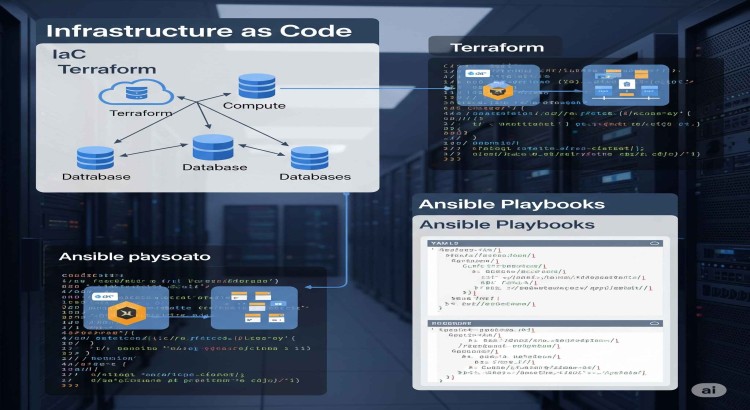
Infrastructure as Code (IaC) Implementation with Terraform & Ansible
Overview:
Managing infrastructure manually is time-consuming, error-prone, and hinders scalability. Infrastructure as Code (IaC) revolutionizes this by allowing you to provision and manage your infrastructure (servers, networks, databases) using code, bringing the benefits of version control, automation, and consistency to your operations. This offer is meticulously designed for organizations seeking to transform their infrastructure management from manual processes to automated, repeatable, and scalable code-driven workflows. With over 6 years of expertise in DevOps and IaC, I specialize in implementing robust solutions using industry-leading tools like Terraform for infrastructure provisioning and Ansible for configuration management. By adopting IaC, you can achieve faster deployments, reduce configuration drift, enhance reliability, and lower operational costs, enabling your teams to focus on innovation rather than manual infrastructure tasks.
Tools & Skills:
- Infrastructure as Code (IaC) Tools: Terraform, Ansible, CloudFormation (AWS), Azure Resource Manager (ARM) templates
- Cloud Platforms: AWS, Azure, Google Cloud Platform (GCP)
- Version Control Systems: Git, GitHub, GitLab, Bitbucket
- Operating Systems: Linux (Ubuntu, CentOS, RHEL), Windows Server
- Scripting Languages: Bash, Python
- CI/CD Integration: Jenkins, GitLab CI/CD, GitHub Actions (for IaC pipeline automation)
- Containerization (Basic): Docker (for local testing of configurations)
- Networking Concepts: VPCs, subnets, security groups, load balancers
- Database Concepts: RDS, Azure SQL, Cloud SQL
- Monitoring & Logging: Integration with cloud-native monitoring tools for infrastructure health.
- Security Best Practices: Implementing secure configurations through IaC.
How I Work:
My approach to IaC implementation is structured, automated, and focused on delivering repeatable infrastructure:
Assessment & IaC Strategy:
- Initial Consultation: A deep dive into your current infrastructure (on-premise or cloud), existing provisioning processes, application dependencies, and desired automation goals.
- Infrastructure Audit: Comprehensive analysis of your existing infrastructure components to identify candidates for IaC and potential complexities.
- Tool Selection: Recommendation and justification of Terraform and Ansible (or other suitable IaC tools) based on your specific environment and needs.
- IaC Readiness Report: A detailed report outlining the benefits of IaC for your organization, identified challenges, and a high-level strategy for adoption.
Design & Planning:
- IaC Architecture Design: Creation of a modular and scalable IaC architecture, defining how infrastructure components will be represented as code.
- State Management Strategy: Planning for Terraform state management (e.g., S3 backend, Terraform Cloud) for collaborative and secure operations.
- Variable & Secret Management: Designing strategies for managing sensitive information (API keys, passwords) securely within your IaC workflows.
- Module Development Plan: If applicable, planning for reusable Terraform modules and Ansible roles.
- Implementation Roadmap: A phased plan for converting existing infrastructure to code and provisioning new resources.
- Client Review & Approval: Presentation of the proposed design for your review, feedback, and final approval.
Implementation & Automation:
- Terraform Configuration Development: Writing Terraform configurations (HCL) to define your cloud or on-premise infrastructure resources (e.g., EC2 instances, VPCs, security groups, databases).
- Ansible Playbook Development: Creating Ansible playbooks to configure and manage the operating systems and applications running on your provisioned infrastructure.
- Version Control Integration: Storing all IaC code in a Git repository for versioning, collaboration, and change tracking.
- CI/CD Pipeline Integration: Integrating IaC workflows into your CI/CD pipelines for automated provisioning, validation, and deployment of infrastructure changes.
- Secret Management Integration: Integrating with secure secret management solutions (e.g., HashiCorp Vault, AWS Secrets Manager) for sensitive data.
- Testing Infrastructure as Code: Implementing basic testing for IaC (e.g., terraform validate, ansible-lint).
Testing, Validation & Optimization:
- Infrastructure Validation: Rigorous testing to ensure that the infrastructure provisioned by IaC matches the desired state and functions correctly.
- Idempotency Testing: Verifying that Ansible playbooks can be run multiple times without causing unintended side effects.
- Performance & Cost Review: Analyzing the performance of the provisioned infrastructure and optimizing resource allocation for cost efficiency.
- Security Audit: Reviewing IaC code for security best practices and potential vulnerabilities.
Documentation & Knowledge Transfer:
- Comprehensive IaC Documentation: Provision of detailed documentation including Terraform configurations, Ansible playbooks, module usage, and deployment instructions.
- Best Practices Guide: Recommendations for ongoing IaC maintenance, versioning strategies, and security considerations.
- Training & Knowledge Transfer: Dedicated sessions to train your development and operations teams on managing, extending, and troubleshooting your IaC workflows.
Why Choose Me?
- 6+ Years of IaC Expertise: Proven experience in automating infrastructure provisioning and configuration with Terraform and Ansible.
- Repeatable & Consistent Environments: Eliminate configuration drift and ensure identical environments across development, staging, and production.
- Faster Deployments: Provision complex infrastructure in minutes, not days or weeks.
- Reduced Errors: Automate manual tasks, significantly reducing human error and improving reliability.
- Cost Efficiency: Optimize resource utilization and avoid over-provisioning through code-driven infrastructure.
- Enhanced Collaboration: Enable seamless collaboration between development and operations teams through version-controlled infrastructure.
